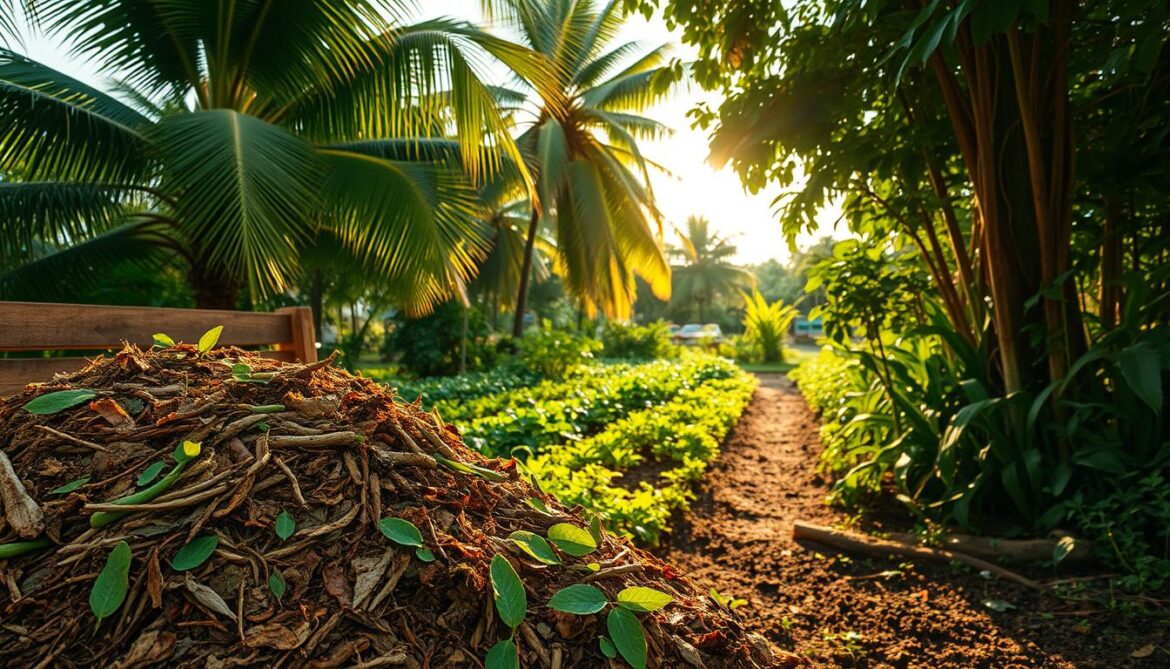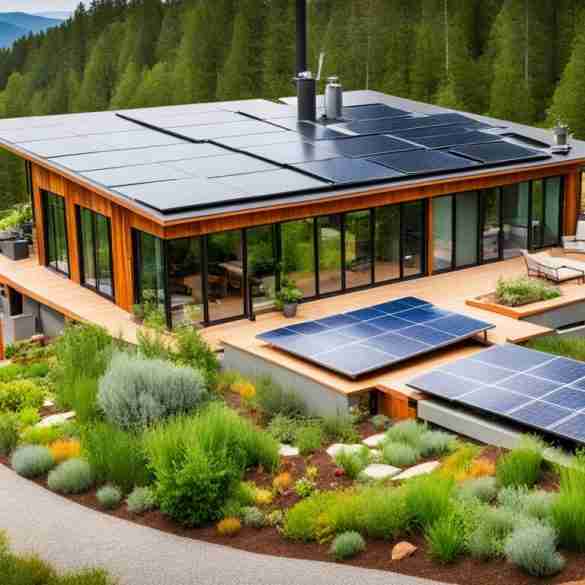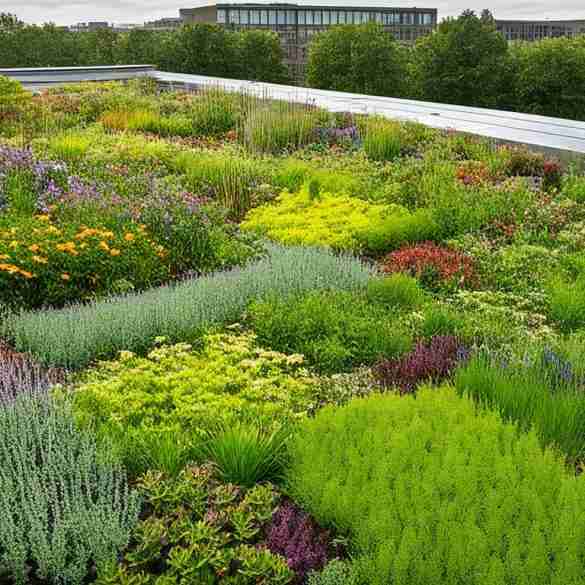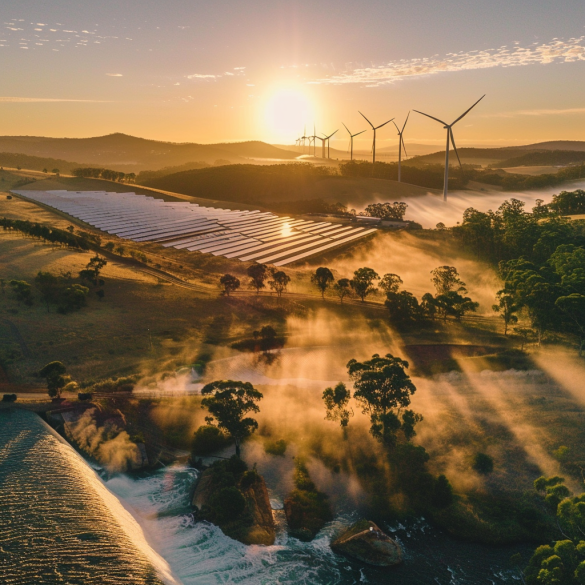Did you know that Queensland homes can cut up to 50% of their waste by composting? In Queensland’s lush, tropical setting, turning kitchen scraps and yard waste into soil is not just doable—it’s a big win for gardening. It’s a sustainable way to improve your garden.
Composting in Queensland needs a special touch because of the climate. Your backyard can turn waste into valuable soil. This not only helps the environment but also makes your plants grow better.
Sustainable Home Magazine is here to help you learn about composting in Queensland. We’ll make it easy to understand and apply to your garden. You’ll discover how to make compost work well in Queensland’s tropical weather.
Key Takeaways
- Understand Queensland’s unique tropical composting challenges
- Learn sustainable waste reduction techniques
- Discover how to transform organic waste into garden nutrients
- Adapt composting methods to subtropical climate
- Reduce household waste effectively
Understanding Queensland’s Tropical Climate Impact on Composting
Subtropical gardening in Queensland comes with its own set of challenges and opportunities. The tropical climate here greatly affects how organic matter breaks down. It’s important to know how to compost in this climate for effective waste management and nutrient recycling.

Seasonal Weather Patterns and Composting Cycles
Queensland has two main seasons that change how composting works:
- Wet Summer (November-April): High humidity speeds up decomposition
- Dry Winter (May-October): Less moisture means you need to take extra steps
Temperature and Humidity Considerations
The tropical temperatures in Queensland, between 20-35°C, are perfect for fast organic breakdown. Composting microbes grow well in these warm temperatures. This makes composting faster than in cooler places.
| Climate Factor | Composting Impact | Recommended Action |
|---|---|---|
| High Temperature | Accelerated Decomposition | Regular moisture monitoring |
| High Humidity | Increased Microbial Activity | Ensure proper aeration |
Regional Climate Variations Across Queensland
Queensland’s varied landscape means composting methods need to adjust for local conditions. Coastal areas have different conditions than inland ones. This requires tailored approaches to subtropical gardening.
Understanding your local environment is key to creating a successful composting system.
Essential Ingredients for Successful Tropical Composting
In Queensland’s tropical climate, making nutrient-rich compost is key. It’s all about the right mix of ingredients. This mix turns your food waste into garden gold.

Composting is like an art. It’s about mixing the right stuff to make decomposition happen. You need to balance two main types of materials.
Green Materials for Nitrogen Balance
Green materials are the protein-rich parts of your compost. They add nitrogen and help things break down fast. They also support the growth of microbes:
- Fresh grass clippings
- Fruit and vegetable scraps
- Coffee grounds
- Green plant trimmings
- Fresh manure from herbivore animals
Brown Materials for Carbon Content
Brown materials are the carbon-rich parts of your compost. They help create air pockets and structure. Here are some examples:
- Dry leaves
- Cardboard
- Newspaper
- Wood chips
- Straw
Local Organic Matter Sources
Queensland is full of places to find composting materials. Local gardens, farms, and kitchens have plenty of organic waste. By using what’s around you, you can make compost that’s good for your garden and the planet.
Try to mix 3 parts brown materials with 1 part green materials. This mix helps things break down well and keeps smells away. It’s a smart way to manage waste.
Composting Techniques Tailored for Queensland’s Climate
Composting in Queensland needs special methods for the tropical weather. You can turn kitchen and garden waste into soil that’s good for your garden. This is thanks to different composting ways.

Your tropical garden has many composting options. Let’s look at the best ones for Queensland folks:
- Hot composting uses Queensland’s heat to break down waste fast
- Vermicomposting is great for small spaces and city living
- Bokashi composting is good for all kinds of kitchen waste
Choosing the right composting way can change how you handle waste. Each method has its own perks for different homes.
| Composting Method | Best For | Decomposition Speed |
|---|---|---|
| Hot Composting | Large gardens, active gardeners | 4-6 weeks |
| Vermicomposting | Small spaces, apartments | 8-12 weeks |
| Bokashi Composting | Kitchen waste, limited outdoor area | 2-4 weeks (fermentation) |
Picking the best composting method depends on your needs. Whether you have a big backyard or a small balcony, Queensland’s climate supports many composting ways. These can help you cut down waste and make your garden soil rich and healthy.
Advanced Composting Methods for Hot Weather
Queensland’s tropical climate makes composting a bit tricky but also exciting. By learning advanced composting, you can turn waste into soil that makes your garden grow better.

Hot Composting Techniques for Maximum Efficiency
Hot composting is great for Queensland’s warm weather. It uses high heat to break down waste quickly, making compost faster than usual methods.
- Maintain pile temperatures between 130-150°F for optimal microbial activity
- Turn compost regularly to ensure even heat distribution
- Use compost tumblers to simplify aeration and temperature management
Vermicomposting in Tropical Conditions
Vermicomposting is a smart way to handle waste in hot climates. It uses worms that thrive in tropical weather to make compost easily.
- Select heat-tolerant worm species like Eisenia fetida
- Provide shaded, well-ventilated worm bins
- Maintain consistent moisture levels
Bokashi Composting: A Unique Fermentation Approach
Bokashi composting uses a special fermentation process that works well in hot weather. It lets you compost more types of waste, like meat and dairy.
Consider making compost tea for your garden. It’s a liquid fertilizer that gives your plants a quick boost of nutrients and beneficial microbes.
Pro tip: Experiment with different advanced composting methods to find the approach that best suits your specific gardening needs and local conditions.
Choosing the Right Composting System
Finding the right compost bin design for your Queensland home is key. Different systems have their own perks. Knowing what each offers helps you pick wisely.
Looking at composting gear, you’ll see many options for tropical climates:
- Open Compost Heaps: Ideal for larger properties
- Enclosed Bins: Perfect for urban and suburban spaces
- Rotating Barrel Systems: Excellent for quick decomposition
- Worm Farms: Great for compact areas with consistent temperatures
The upkeep of your compost pile depends on your chosen system. Queensland’s unique climate requires special consideration when picking your composting setup.
| Composting System | Space Required | Decomposition Speed | Best For |
|---|---|---|---|
| Open Heap | Large | Moderate | Rural properties |
| Enclosed Bin | Small | Slow | Urban gardens |
| Rotating Barrel | Medium | Fast | Active gardeners |
| Worm Farm | Small | Very Fast | Apartment dwellers |
Think about your space, time, and gardening aims when picking a system. Each has special benefits for managing waste in Queensland’s climate.
Pro Tip: Match your composting system to your lifestyle for sustainable success!
Managing Moisture Levels in Tropical Compost
Learning to control moisture is key in composting, more so in Queensland’s tropical climate. The success of your compost pile depends on finding the right balance. Knowing how to amend the soil can make composting a breeze.
Good composting starts with knowing how much water your materials need. Too much water can lead to bad conditions, while too little stops decomposition.
Drainage Solutions for Tropical Composting
Having a good drainage system is vital for compost health. Here are some important tips:
- Elevate your compost bin on a slight slope
- Use coarse materials like wood chips at the base
- Install drainage holes in your composting container
- Create multiple layers with different textures
Moisture Control Techniques
Keeping an eye on your compost’s moisture is an art. Aim for a consistency similar to a wrung-out sponge. Here are some useful methods:
- Add brown materials to absorb excess moisture
- Cover your compost during heavy rainfall
- Check moisture levels weekly
- Use a moisture meter for precise tracking
Monsoon Season Adaptations
Queensland’s heavy rain calls for special composting tactics. Keep your organic matter safe with covers and good airflow. The right spot for your compost bin can also help a lot.
Pro tip: Regularly turn your compost during wet periods to prevent waterlogging and maintain aerobic conditions.
Preventing and Solving Common Tropical Composting Issues
Composting in Queensland’s tropical climate can be tricky. Knowing the common problems helps gardeners succeed. Whether you’re new or experienced, solving these issues keeps your compost healthy.
Keeping pests out of your compost is key. Pests can ruin your composting efforts. But, with the right methods, you can keep your compost balanced and productive.
- Identify common composting pests
- Implement natural deterrent methods
- Maintain proper compost balance
Managing odors is also important for tropical composters. Bad smells mean your compost is out of balance. Knowing why helps fix the problem fast.
| Composting Issue | Potential Cause | Solution |
|---|---|---|
| Foul Odors | Excess Moisture | Add Brown Materials |
| Slow Decomposition | Lack of Nitrogen | Incorporate Green Materials |
| Pest Invasion | Exposed Food Scraps | Bury Organic Waste |
Effective composting needs the right moisture, green and brown balance, and aeration. Temperature and ingredient ratio are vital for tropical composting success.
Remember: A healthy compost pile should smell earthy and fresh, not rotten or overly pungent.
Use these pest control and odor management tips for a thriving compost in Queensland’s tropical climate. Stay alert, make small changes, and your compost will give you rich organic matter for your garden.
Maximizing Decomposition Rates in Hot Climate
Queensland’s tropical weather is great for speeding up composting. Learning about composting microorganisms can make managing organic waste a way to improve soil.
To keep your compost pile working well, you need the right environment for microbes. The right conditions can make organic matter turn into nutrient-rich soil fast.
Microbial Activity Optimization
Composting microorganisms need certain conditions to thrive. Your compost pile is like a tiny world where microbes break down organic stuff. Important factors for their success include:
- Balanced carbon to nitrogen ratio
- Consistent moisture levels
- Appropriate temperature range
- Regular oxygen circulation
Aeration Strategies
Hot composting needs good aeration to keep microbes healthy. Oxygen is key for decomposition and stopping anaerobic conditions that slow things down.
| Aeration Technique | Effectiveness | Effort Level |
|---|---|---|
| Pitchfork turning | High | Moderate |
| Compost tumbler | Very High | Low |
| Aerating tools | Moderate | Low |
Temperature Management Methods
Watching your compost pile’s temperature is key for good decomposition. Ideal temperatures range between 130-150°F (54-66°C). This speed up breakdown and kills harmful pathogens.
Using these advanced methods, you can turn your compost pile into a top-notch organic recycling system. It’s perfect for Queensland’s hot weather.
Sustainable Garden Integration and Application
Turning your Queensland garden into a thriving ecosystem starts with smart soil enrichment. Composting is more than just managing waste. It’s a key tool for creating landscapes that are both resilient and productive, even in tropical conditions.
Your compost acts as a nutritional powerhouse for your garden. By using green manure crops and smart composting, you’ll see amazing benefits for your plants. The right methods can greatly improve soil structure, water retention, and nutrient levels.
- Enhance soil fertility naturally
- Reduce dependency on chemical fertilizers
- Support local ecosystem biodiversity
- Create sustainable garden cycles
Practical application is key. Spread mature compost around vegetable beds, fruit trees, and native plants. For container gardens or raised beds, mix compost into the soil for a nutrient-rich environment.
Your garden is a living system—compost is its lifeblood.
Green manure crops are another smart move. Planting nitrogen-fixing legumes like cowpeas or mucuna regenerates soil and adds organic matter for future composting.
Queensland gardeners can use these methods to create landscapes that are both resilient and low-maintenance. These landscapes thrive in tough tropical climates. Your dedication to composting not only improves your garden but also helps the environment.
Year-Round Composting Schedule for Queensland Gardens
Learning to compost in Queensland means understanding our tropical climate’s rhythms. Your composting journey starts with adapting to our wet and dry seasons. Each season brings its own challenges and chances for gardening sustainably.
In the wet season (November to April), manage moisture in your compost. Use dry materials like leaves and cardboard to balance humidity. A cover or shelter can protect your compost from too much rain. This keeps the compost’s carbon-to-nitrogen ratio right for decomposition.
The dry season (May to October) requires a different plan. Use materials like coconut coir to keep moisture in. Add shade to prevent drying out. Turn your compost pile less often to save moisture and protect microbes.
Composting in Queensland is all about being flexible and watching your garden. Keep track of your local climate, try new methods, and adjust as needed. By being attentive to seasonal changes, you’ll make compost that feeds your garden all year.
FAQ
Q: How does Queensland’s tropical climate affect composting?
A: Queensland’s warm, humid climate helps composting a lot. It makes it easier for microorganisms to break down organic materials. But, you need to watch the moisture to avoid too much water or dryness.
Q: What are the best materials to compost in a tropical climate?
A: In Queensland, mix green materials like fruit scraps and coffee grounds with brown materials like dried leaves. Local stuff like sugar cane mulch works great too.
Q: Which composting method works best in Queensland?
A: Hot composting and vermicomposting are top choices in Queensland. Hot composting uses heat to break down materials fast. Vermicomposting uses worms for efficient waste processing, even in small spaces.
Q: How do I manage moisture in my compost during Queensland’s wet season?
A: In the wet season, focus on drainage and using brown materials to soak up excess water. A covered bin or extra carbon-rich materials can help keep moisture balanced.
Q: Can I compost meat and dairy in Queensland?
A: Traditional composting doesn’t handle meat and dairy well. But, bokashi composting is a great option. It ferments these materials, making it perfect for small spaces.
Q: What common problems might I encounter when composting in a tropical climate?
A: You might face odors, pests, and slow decomposition. Balance green and brown materials, ensure aeration, and manage moisture. Also, avoid meat and dairy in traditional piles.
Q: How long does it take to produce finished compost in Queensland?
A: Queensland’s warm climate makes composting faster. Hot composting can finish in 4-6 weeks. Vermicomposting is even quicker, usually in 2-3 months.
Q: Is composting suitable for small spaces or apartments?
A: Yes! Vermicomposting and bokashi composting are great for small areas. Worm farms and bokashi systems are compact and odor-free, perfect for apartments and small homes.







